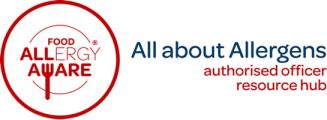Risk management for food allergen management
There are a number of ways that food safety risks for food allergens can be managed, which are listed below. These may be used by authorised officers to help educate businesses about food allergen management.
Customer service
- Does the food service provide customers with accurate information about the ingredients of meals when they ask? What evidence can they provide (for example, a food allergen menu matrix or standardised recipe template)?
- Does the food service have a written procedure to follow if a customer says they have a food allergy? Can they provide you with a copy?
- Does the food service include a note on the menu, booking website, or service counter asking customers to inform service staff of their food allergy when ordering food?
- Does the business have an incident log book and is this used for food allergen related complaint precedures?
Product information
- Does the food service only accept labelled foods or foods supplied with ingredient information (Product Information Form)?
- Does the food service have a procedure in place to check all ingredients (including sauces, spices, garnish, oils, dressings etc.) for food allergens each time they are ordered and received?
- Are products and menu items checked regularly to check if ingredients and allergens have changed?
- Does the food service train staff to not substitute ingredients when preparing food for a customer with food allergy? If a substitute ingredient must be used, is there a procedure in place to ensure the product is checked for food allergen content?
- Does the food service have a food allergen menu matrix for each menu item? How regularly is the food allergen menu matrix reviwed and/or updated? An example food allergen menu matrix can be downloaded from: https://www.foodallergytraining.org.au/resources/allergen-menu-matrix
Food preparation
- Does the food service have processes in place to avoid cross contamination of food allergens? Can they provide you with examples of these processes?
- Does the food service have a procedure in place that requires staff to handle food safely with clean hands washed with liquid soap and warm running water? Hands should be washed regularly, and they should be re-washed before preparing food that must be free of a specific allergen.
- Does the food service clean and sanitise work surfaces, utensils and food preparation equipment between foods?
- Are the staff in the food service aware that even trace amounts of a food the customer is allergic to can cause harm?
- Does the food service store food safely in separate sealed, labelled containers marked with the product name, ingredients, allergen statements, and the use-by or best-before dates?
- Does the food service have a separate or dedicated area for preparing allergen-free meals?
- Are the staff in the food service aware that food that is safe for one customer with a food allergy may be unsafe for another customer with a different food allergy?
- Does the food service prepare meals for customers with food allergy first?
- Does the food service have a clear way of identifying the meal for the customer with food allergy (for example, a coloured flag or plate for plated meals or stickers for wrapped foods)?
- Does the food service always take the meal to the customer with a food allergy separately (not whilst carrying other meals) to avoid getting the meals mixed up?
- Does the food service check with the customer that the correct allergen free meal is given to the customer with the food allergy declared when serving the meal?
Staff education
- Does the food service have a Food Safety Supervisor (if required by state or territory law) or nominated person responsible for overseeing food safety management? What training has this person done and when? Did the training include in-depth food allergen management training?
- Does the food service train and test all staff regularly in food safety, hygiene and allergen awareness? Free All about Allergens online training is available from www.foodallergytraining.org.au
- Does the food service have a food allergen management policy and are staff made aware of the policy? Sample policies are available from www.foodallergytraining.org.au/resources.
- Does the food service display The Usual Suspects poster or Food allergy aware checklist in the kitchen? These are available free from: Food Allergy Training - Resources - General Food Service
Download this information here: ![]() NAC Risk management for food allergies 2023184.24 KB
NAC Risk management for food allergies 2023184.24 KB
Content updated April 2023
